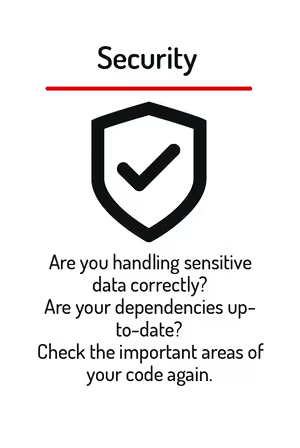Security

Security should be part of every commit. Handling sensitive data correctly, validating inputs, and keeping dependencies up-to-date are non-negotiable. One careless method can create vulnerabilities that are hard to fix later.
For example, storing passwords in plain text is unsafe:
public class UserService {
public void saveUser(String username, String password) {
database.save(username, password); // unsafe!
}
}Refactor using Spring Security’s BCryptPasswordEncoder, a current and maintained library:
import org.springframework.security.crypto.password.Pbkdf2PasswordEncoder;
public class UserService {
private final Pbkdf2PasswordEncoder passwordEncoder =
new Pbkdf2PasswordEncoder(
"secret",16,600_000,
Pbkdf2PasswordEncoder.SecretKeyFactoryAlgorithm.PBKDF2WithHmacSHA256
);
public void saveUser(String username, String password) {
String hashedPassword = passwordEncoder.encode(password);
database.save(username, hashedPassword);
}
public boolean checkPassword(String password, String storedHash) {
return passwordEncoder.matches(password, storedHash);
}
}Here:
-
encodehashes the password with a strong salt. -
matchessafely verifies user input against the stored hash.
Practical habits for secure code:
-
Never store sensitive information in plain text.
-
Validate all user inputs; never trust external data.
-
Use well-maintained libraries like Spring Security for cryptography.
-
Keep dependencies up-to-date and monitor for vulnerabilities.
-
Limit access to sensitive methods and data with proper access control.
Every commit should ask: “Could this expose sensitive data or create a vulnerability?” Using modern, maintained libraries and secure patterns consistently keeps your code safe and maintainable.